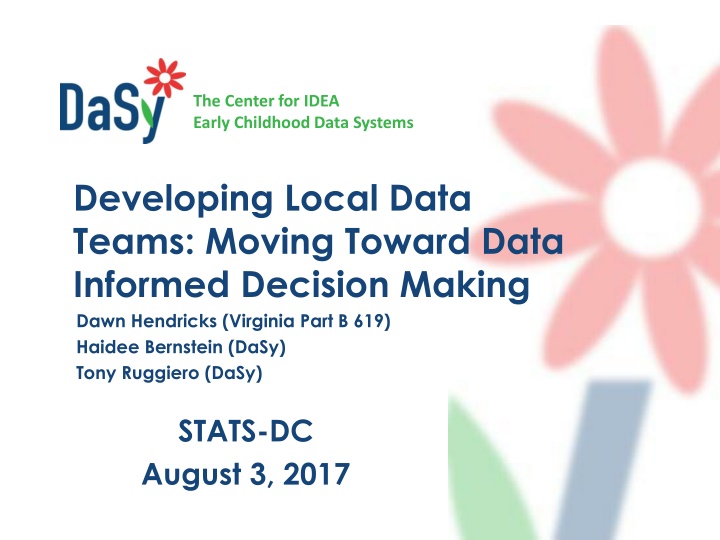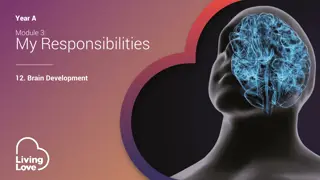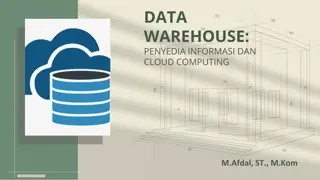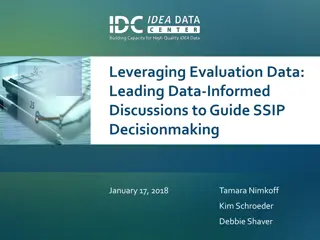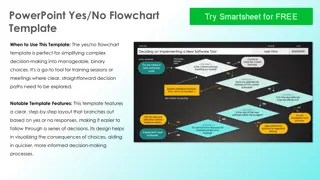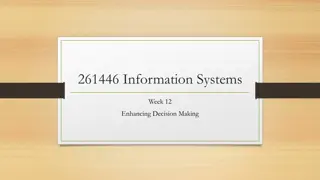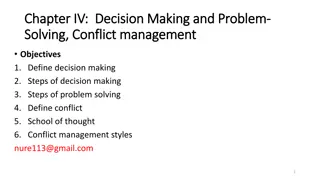Developing Local Data Teams for Informed Decision Making
Components of an effective data team, understand the purpose, perspectives, and guidelines. Learn from state examples like Connecticut for successful data use meetings. Build your own data team for improved program and service decisions.
Download Presentation

Please find below an Image/Link to download the presentation.
The content on the website is provided AS IS for your information and personal use only. It may not be sold, licensed, or shared on other websites without obtaining consent from the author.If you encounter any issues during the download, it is possible that the publisher has removed the file from their server.
You are allowed to download the files provided on this website for personal or commercial use, subject to the condition that they are used lawfully. All files are the property of their respective owners.
The content on the website is provided AS IS for your information and personal use only. It may not be sold, licensed, or shared on other websites without obtaining consent from the author.
E N D
Presentation Transcript
The Center for IDEA Early Childhood Data Systems Developing Local Data Teams: Moving Toward Data Informed Decision Making Dawn Hendricks (Virginia Part B 619) Haidee Bernstein (DaSy) Tony Ruggiero (DaSy) STATS-DC August 3, 2017
Session Goals To define a data team and the function that we hope it can achieve To provide three state examples To make this session interactive and hear from you 2
Definition DATA TEAMS: Groups of individuals dedicated to using data to plan and make decisions about programs and services. 3
Components of an Effective Data Team Define your Purpose! Do you want to: Celebrate successes Address challenges Monitor trends Prioritize needs Analyze data Engage stakeholders 4
Components of an Effective Data Team Understand and Determine the Relevant Perspectives Understand the program/consumers perspective Understand relevant legislation Understand the data and the consumers need for data 5
Components of an Effective Data Team Develop Guidelines for your team Align your values Identify individual team member s strengths Define your purpose Develop a process for your meetings and value it Stay solution-focused & action oriented Revisit goals regularly Monitor and celebrate progress 6
No ONE Right way to form a Data team Build your own data team Embrace your vision and strengths Celebrate diverse perspectives 7
Connecticut Local Data Use Meeting Part B 619 Coordinator requested on-site visit Administrators responsible for early childhood special education that provide FAPE to: eligible children 3 through 5 in preschool, kindergarten grade 1 Great example of cross-center effort 9
Connecticut Local Data Use Meeting Topics included Forming a data team Identifying framework of inquiry options Critical questions Identifying data needed for analysis Options for presenting data Interactive Districts selected critical questions Districts created a data analysis plan 10
Connecticut Local Data Use Meeting Updates 11
Virginia 12
Early Childhood Special Education Data Accuracy Increase Graduation Rates Data Analysis Data Use 13
Early Childhood Special Education Data Indicators Indicator 6 - Early Childhood Environment Indicator 7 - Early Childhood Outcomes Social-emotional development Behavior to meet needs Acquisition and use of knowledge Indicator 12 - Transition from Early Intervention to School 14
DaSy TA Providers Haidee Bernstein Bruce Bull 15
Department of Education State-Wide Local Director, Special Education Program Improvement Assistant Director, Special Education Program Improvement Data Manager 619 Coordinator (Early Childhood Special Education Specialist) Early Childhood Special Education Coordinator Special Education Director Early Childhood Special Education Coordinator Data Manager Teachers 16
Purpose Improve the collection, reporting, and use of ECSE Indicator data, Identify and celebrate strong program components and identify those program components most in need of improvement through state and local data, and Connect, support and empower local leaders to build capacity and provide high-quality programs and services throughout the state for young children with IEPs. 19
Future Activities Collection processes for accuracy and efficiency Reliability checks for local trend reports, year to year changes Validity checks for illogical data Additional resources REPEAT, REPEAT, REPEAT
